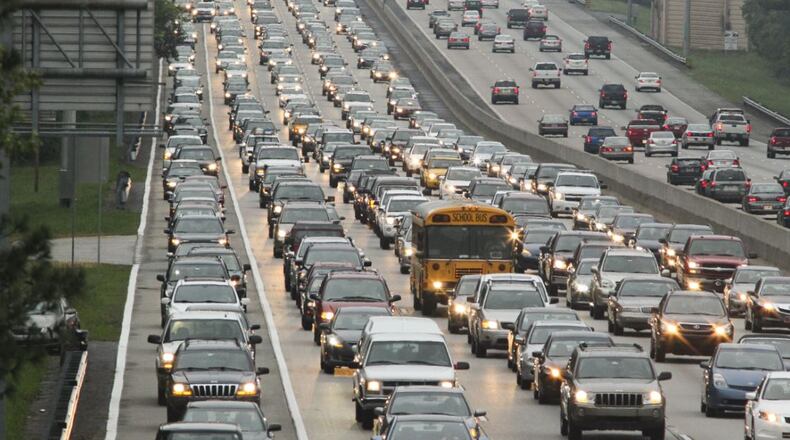Three years ago, Georgia lawmakers raised nearly $1 billion a year for road and bridge construction. This year, they allowed 13 metro Atlanta counties to raise billions of dollars more for mass transit.
The candidates for Georgia governor say more must be done to tackle traffic and improve transportation across the Peach State. But Democrat Stacey Abrams and Republican Brian Kemp offer different visions of what should be done and how to pay for it.
Whoever wins will face some big transportation decisions that could affect the lives and livelihoods of millions of Georgia residents. One example: whether Georgia continues to invest in mass transit construction in Atlanta and across the state.
In May, Gov. Nathan Deal signed legislation allowing metro Atlanta counties to raise sales taxes for transit construction. The governor and state lawmakers also devoted $100 million in bonds to build bus rapid transit interchanges along Ga. 400 in north Fulton County.
Those moves were a dramatic about-face for a state that traditionally has invested little in public transportation. Deal was a key proponent of the transit initiatives, and the next governor may determine whether funding for mass transit remains a priority.
In written answers to Atlanta Journal-Constitution questions, Abrams pledged to set aside $150 million in bonds for transit.
The Democrat said she would “ensure that the state remains a key investor in transit through our bonding capacity; general fund incentives where appropriate; and inclusion of transit as a permitted use of motor fuel taxes, without sacrificing our current efforts on roads, bridges and economic development projects.”
In his responses, Kemp said he would continue “investment in targeted projects” such as the Ga. 400 bus facilities. But he wants private as well as public investment.
“As governor, when proposing new projects, taxes or incentives, my first two questions are going to be ‘what is the cost?’ and ‘who is going to pay for it?’” the Republican said. “I believe a successful transit infrastructure should be a public-private partnership — and it should benefit the entire state.”
Other mass transit decisions may come next year. After tackling transit issues in metro Atlanta, a House of Representatives commission is studying transit in rural areas and small cities. It could recommend additional funding or other measures in the upcoming legislative session.
Both candidates said they look forward to working with lawmakers on solutions to the state’s transit problems.
Though transit has gained most of the attention this year, road construction remains the focus of Georgia’s $1.9 billion transportation budget. And the governor plays a big role in picking which projects get done.
In 2015, the General Assembly agreed to revamp gas taxes and impose other taxes and fees to raise nearly $1 billion extra for road and bridge construction. Deal later announced the money would help pay for 11 major road projects, including the new toll lanes on Ga. 400 and the top half of the Perimeter and new I-285 interchanges at I-20 east and west of Atlanta.
But the state's method for selecting projects came under fire in an audit last year. It found the process is not transparent enough and relies too little on objective criteria.
One example: State transportation officials gave a green light to a $2 billion plan to add 40 miles of trucks-only lanes on I-75 between Macon and McDonough without clear evidence the project is needed. The audit also found local officials believe political influence is a significant factor in determining which projects get state funding, and taxpayers can’t be sure their money goes to the worthiest projects.
Both gubernatorial candidates pledged to ensure tax dollars are well spent.
“Projects should be prioritized on their benefit for Georgians by improving the movement of people and goods to improve the quality of life and grow the economy,” Kemp said. “I will continue to build on the efforts of transparency in government to ensure accountability and increase confidence.”
Abrams said a “transparent, data-driven procurement process is the primary solution to the issues raised by the state auditor.” She said she would support legislation to incorporate best practices into the selection process and would “institute a rigorous review of existing projects to ensure that no hidden biases have been at play in awarding contracts or selecting locations.”
Georgia residents differ on which candidate would do the best job addressing the state’s transportation needs. Ann Lord of Roswell believes Abrams is the best candidate.
“I feel that Stacey Abrams’ policies are more attractive to bringing in businesses,” Lord said. “If we have more businesses, it leads to more income and state revenue, which could lead to more money to support improvements in transportation.”
Tim Evans of Johns Creek doesn’t think much can be done to address the region’s traffic problems. But he trusts Kemp to trim regulations he says make it hard to get road work done quickly.
“I think Kemp would be the one,” Evans said, “since he has one foot in common sense.”
OUR REPORTING
The Atlanta Journal-Constitution will focus this week's election coverage on how the two major candidates for governor, Republican Brian Kemp and Democrat Stacey Abrams, plan to deal with key issues facing Georgia. Numerous AJC stories have already explored major issues such as health care, criminal justice and public safety. Look for more at ajc.com/politics as the state approaches Election Day on Nov. 6.
Sunday: Priorities in the state's budget
Monday: Problems facing rural Georgia
Tuesday: What needs to be done about education
Wednesday: Where candidates differ on social issues
Thursday: What's needed to improve transportation
Friday: Impact on the state's relations with the city of Atlanta
About the Author







